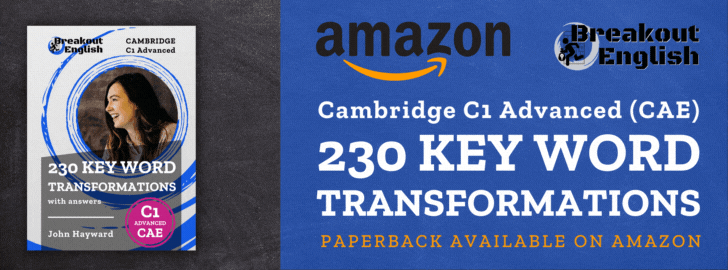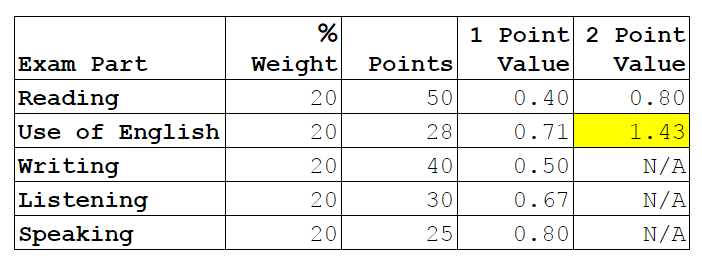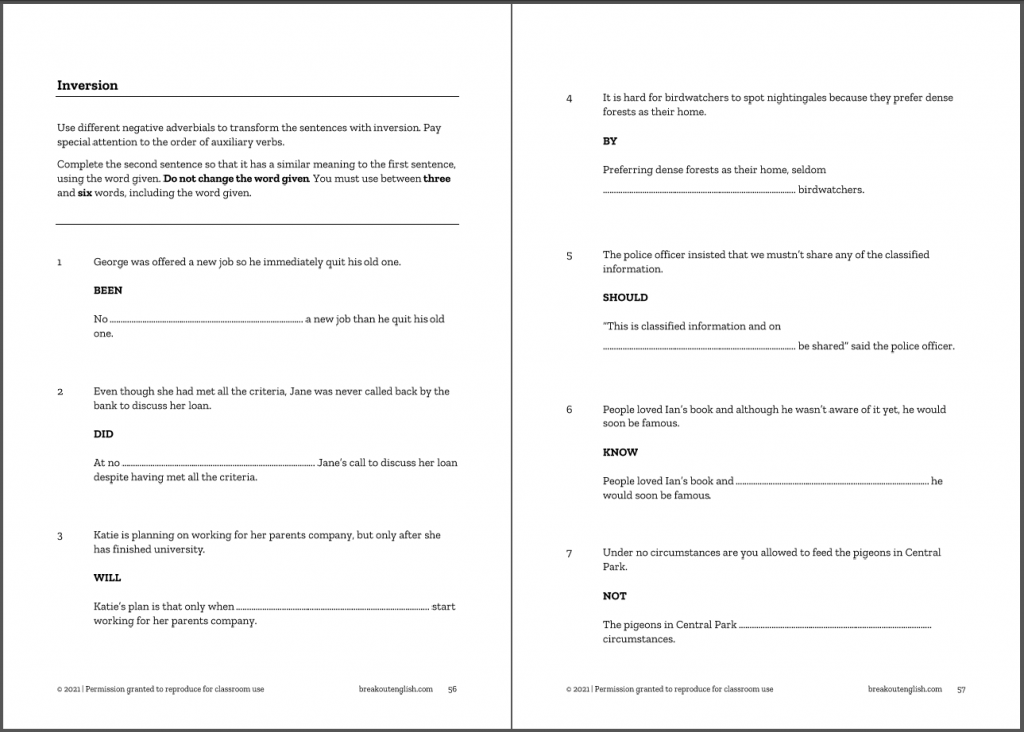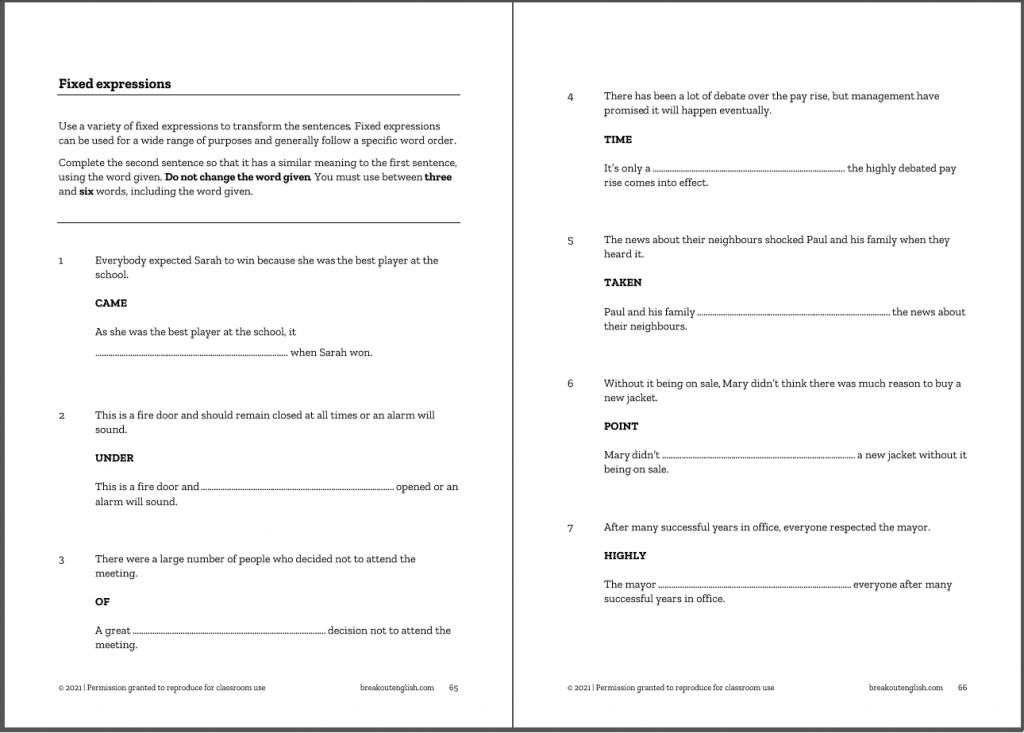Cambridge English: Advanced (CAE) / KEY WORD TRANSFORMATIONS
Task Type: Key Word Transformations.
Focus: Grammar and vocabulary.
Format: Each question consists of a sentence followed by a ‘key’ word and a second sentence with a gap in the middle. You have to use this key word to complete the second sentence so that it means the same as the first sentence.
Number of questions: 6
How many marks are there: Up to two marks for each correct answer.
What is testing:
- idioms and fixed phrases
- phrasal verbs
- verb patterns
- word combinations
- collocations
- linking words//inversion/conditionals/unreal past/
General Advice:
- Write between three and six words as your answer.
- Contractions like can’t or mustn’t are counted as two words.
- Take a guess if necessary! You will not lose marks.
- Remember that you cannot change the key word.
cambridge english: ADVANCED (cea)
KEY WORD TRANSFORMATIONS
practice tests
- Key Word Transformations 1
- Key Word Transformations 2
- Key Word Transformations 3
- Key Word Transformations 4
- Key Word Transformations 5
- Key Word Transformations 6
- Key Word Transformations 7
- Key Word Transformations 8
- Key Word Transformations 9
- Key Word Transformations 10
- Key Word Transformations 11
- Key Word Transformations 12
- Key Word Transformations 13
- Key Word Transformations 14
- Key Word Transformations 15
- Key Word Transformations 16
- Key Word Transformations 17
- Key Word Transformations 18
- Key Word Transformations 19
- Key Word Transformations 20
- Key Word Transformations 20
- Key Word Transformations 19
- Key Word Transformations 18
- Key Word Transformations 17
- Key Word Transformations 16
- Key Word Transformations 15
- Key Word Transformations 14
- Key Word Transformations 13
- Key Word Transformations 12
- Key Word Transformations 11
- Key Word Transformations 10
- Key Word Transformations 9
- Key Word Transformations 8
- Key Word Transformations 7
- Key Word Transformations 6
- Key Word Transformations 5
- Key Word Transformations 4
- Key Word Transformations 3
- Key Word Transformations 2
by Adam Skimins 7th March 2022
- Article navigation:
- 40 Key Word Transformation: Exercises
- C1 Advanced (CAE) Use of English Part 4: Tips & Strategy
The important thing in key word transformations is that you keep the meaning the same – EXACTLY the same. So it’s important that you read through the first sentence and your second sentence to ensure you have kept the meaning the same.
Look at the key word. What type of word is it? What usually follows it, e.g. an infinitive, a preposition, or could it be part of a phrasal verb?
- Think about the other words that need to change in the new word order, e.g. an adjective may become a noun or vice versa.
- Your answer may include words or expressions not used in the first sentence, but these must express exactly the same idea.
- Remember that contracted words count as two words, e.g. won’t = will not.
Because of the scoring system, it’s possible to get 50% in this section without getting any of the questions 100% correct. So it’s worth answering every question! Even incomplete answers can get points
post sponsored by: Zintego
40 Key Word Transformation: Exercises
Complete the sentence so that it has a similar meaning. Do not change the word given. You must use between two and six words, including the word given.
Brian was really interested in North American history in his school days.
Brian had an interest in (INTEREST) North American history in his school days.
Darius soon recovered after the operation on his knee and was able to rejoin the team.
After the operation on his knee, Darius (MADE) and was able to rejoin the team.
made a fast recovery
You must include the word given (MADE)You must use beetwen 3 and 6 words.
I always hated pasta when I was a child but now I cook it regularly.
I (USE) pasta when I was a child but now I cook it regularly.
didn’t use to likedid not use to like
You must include the word given (USE)You must use beetwen 3 and 6 words.
It was a mistake not to write the telephone number down.
I should (POINT) writing down the telephone number.
have made a point of
You must include the word given (POINT)You must use beetwen 3 and 6 words.
If Marc hadn´t taken up politics, he might have become a famous art historian.
If Marc hadn’t taken up politics, he might have (NAME) himself as an art historian.
made a name for
You must include the word given (NAME)You must use beetwen 3 and 6 words.
This holiday is withing our price range, provided we don’t go to the expensive restaurants in the tourist centre.
We (AFFORD) as we avoid the expensive restaurants in the tourist centre.
can afford this holiday as long
You must include the word given (AFFORD)You must use beetwen 3 and 6 words.
Yesterday I informed my boss in writing that I would be leaving the company.
I (NOTICE) to my boss yesterday.
handed in my notice
You must include the word given (NOTICE)You must use beetwen 3 and 6 words.
Complete the sentence so that it has a similar meaning. Do not change the word given. You must use between two and six words, including the word given.
Brian was really interested in North American history in his school days.
Brian had an interest in (INTEREST) North American history in his school days.
It’s very unlikely that martin will win the 100 metres, as he’s out of training.
Martin has almost (CHANCE) the 100 metres, as he’s out of training.
no chance of winning
You must include the word given (CHANCE)You must use beetwen 3 and 6 words.
Most of the children ignored what the teacher had told them.
Few of the children (NOTICE) what the teacher had told them.
took notice of
You must include the word given (NOTICE)You must use beetwen 3 and 6 words.
The company is unable to guarantee an allocated car-parking space to all employees.
The company’s employees shouldn´t (COUNT) allocated a car-parking space.
count on being
You must include the word given (COUNT)You must use beetwen 3 and 6 words.
He no longer thinks he can find a job before the end of the year.
He has given (HOPE) a job before the end of the year.
up hope of finding
You must include the word given (HOPE)You must use beetwen 3 and 6 words.
I’m sure Jemma is going to become a famous model one day.
I think it’s only (MATTER) Jemma becomes a famous model.
a matter of time before
You must include the word given (MATTER)You must use beetwen 3 and 6 words.
I think learning to use a typewriter is a waste of time.
I can´t (POINT) how to use a typewriter.
see the point in learningsee the point of learning
You must include the word given (POINT)You must use beetwen 3 and 6 words.
Complete the sentence so that it has a similar meaning. Do not change the word given. You must use between two and six words, including the word given.
Brian was really interested in North American history in his school days.
Brian had an interest in (INTEREST) North American history in his school days.
The company has a good reputation in the local area.
The company (HIGHLY) of in the local area.
is highly spoken
You must include the word given (HIGHLY)You must use beetwen 3 and 6 words.
Nadia’s friend arrived just as she was about to leave the restaurant.
Nadia was (POINT) the restaurant when her friend arrived.
on the point of leaving
You must include the word given (POINT)You must use beetwen 3 and 6 words.
I don’t expect the company to make a profit this year, given the economic climate.
Given the economic climate, (SURPRISED) the company made a profit this year.
i would be surprised if
You must include the word given (SURPRISED)You must use beetwen 3 and 6 words.
Barbara´s parents were certain that she would be a great tennis player.
Barbara’s parents were (DOUBT) that she would be a great tennis player.
in no doubt
You must include the word given (DOUBT)You must use beetwen 3 and 6 words.
My grandfather had completely forgotten that he phoned me last night.
My grandfather didn’t (RECOLLECTION) phoning me last night.
have any recollection of
You must include the word given (RECOLLECTION)You must use beetwen 3 and 6 words.
Pay claims must be submitted before the end of the month.
You have (PUT) your pay claims before the end of the month.
to put in
You must include the word given (PUT)You must use beetwen 3 and 6 words.
Complete the sentence so that it has a similar meaning. Do not change the word given. You must use between two and six words, including the word given.
Brian was really interested in North American history in his school days.
Brian had an interest in (INTEREST) North American history in his school days.
Given that he has no experience, will Glyn be able to do this job?
Will Glyn’s (AFFECT) ability to do this job?
lack of experience affect his
You must include the word given (AFFECT)You must use beetwen 3 and 6 words.
At no time did we think that Pedro might be planning to leave the country.
It (OCCURED) that Pedro might be planning to leave the country.
never occured to ushad never occured to us
You must include the word given (OCCURED)You must use beetwen 3 and 6 words.
I’m sure we went the wrong way at the last junction.
We must (TAKEN) at the junction.
have taken the wrong turninghave taken the wrong turn
You must include the word given (TAKEN)You must use beetwen 3 and 6 words.
We wanted to continue our mountain trek but the weather was too bad.
We (LIKE) on with our mountain trek but the weather was too bad.
would like to have carriedwould have liked to carry
You must include the word given (LIKE)You must use beetwen 3 and 6 words.
No changes will be made to this project.
This project will (AHEAD) to plan.
go ahead according
You must include the word given (AHEAD)You must use beetwen 3 and 6 words.
Simon really ought to make a decision about his future.
It’s high time Simon (MIND) about his future.
made up his mind
You must include the word given (MIND)You must use beetwen 3 and 6 words.
Complete the sentence so that it has a similar meaning. Do not change the word given. You must use between two and six words, including the word given.
Brian was really interested in North American history in his school days.
Brian had an interest in (INTEREST) North American history in his school days.
Phoebe was surprised to be offered a place on the course.
The offer of a place on the course (CAME) Phoebe.
came as a surprise to
You must include the word given (CAME)You must use beetwen 3 and 6 words.
I can´t deny that I was embarrassed to be given the award.
There’s (NO) embarrassment at being given the award.
no denying my
You must include the word given (NO)You must use beetwen 3 and 6 words.
I think Anita must have gone on a diet recently because she’s quite slim now.
It looks as (HAS) dieting because she’s quite slim now.
if anita has been
You must include the word given (HAS)You must use beetwen 3 and 6 words.
Delia said that she would no longer tolerate her colleagues being rude.
‘I am not willing (PUT) from my colleagues any longer, ‘ said Delia.
to put up with any rudeness
You must include the word given (PUT)You must use beetwen 3 and 6 words.
It’s difficult to know what my reaction would have been in that situation.
I’m not (HOW) in that situation.
sure how i would have reacted
You must include the word given (HOW)You must use beetwen 3 and 6 words.
Do you mind if I come over to see you later?
Do you (OBJECTION) coming over to see you later?
have any objection to me
You must include the word given (OBJECTION)You must use beetwen 3 and 6 words.
Would you pass C1 Advanced (CAE)?
Sign up, resolve the tests and see what results you get.
Sign up
C1 Advanced (CAE) Use of English Part 4: Tips & Strategy
C1 Advanced (CAE) Use of English: Part 4 question type here is called key word transformation.
You have to complete the second sentence, using the key word.
Strategy
- Read the sentence carefully and think about its exact meaning.
- Check your tenses – if the first sentence is in the past tense, the second should be, too!
- Contractions (e.g. haven’t) count as two words.
- Try to keep the same meaning – If the first sentence says ‘Tom said…’ then don’t write ‘He said…’ in the second sentence. (Write ‘Tom said’.)
- Write between two and six words, including the word given.
Tips
Find things that are the same in both sentences and delete them. That helps you to focus on what you actually need to be transforming.
Make absolutely sure that the two sentences mean the same thing. For example, if the sentence to transform has names in it, the answer will have to have them too.
Would you pass C1 Advanced (CAE)?
Sign up, resolve the tests and see what results you get.
Sign up
Key word transformations are probably the most identifiable task type in Cambridge exams. You’ll find them at B2 First, C1 Advanced and C2 Proficiency levels. With each level, the questions get longer and more challenging.
When it comes to CAE key word transformations, you’ll need to know your C1 grammar and vocabulary like the palm of your hand. To help, we’ve created a book of 230 C1 key word transformations. The book follows 25 units based on commonly tested grammar and vocabulary in the exam.
Find some free samples of the transformations from this book:
- Advanced (CAE) Transformations – Inversion
- Advanced (CAE) Transformations – Fixed Expressions
The book is available as a digital key word transformation exercises pdf here on Breakout English or grab a physical paperback copy on Amazon.
GET 230 C1 ADVANCED (CAE) KEY WORD TRANSFORMATIONS:
Why are CAE key word transformations important?
It’s only one activity in the entire exam, but it’s arguably the most important activity because it’s worth so many points. Transformations are marked as part of the Use of English paper. This paper consists of Parts 2, 3 and 4 of the Reading and Use of English section of the exam. Even though Part 1 looks like a Use of English task, it’s counted as part of your reading mark.
- Use of English Part 2 – Open cloze – 8 points (1 point per question)
- Use of English Part 3 – Word formation – 8 points (1 point per question)
- Use of English Part 4 – Key word transformations – 12 points (2 points per question)
With only 28 total points available in Cambridge Advanced Use of English, the key word transformations C1 task is worth 43% of your Use of English mark. Compared to other sections of the exam where there are more tasks with more questions and therefore more points available, key word transformations carry the highest per question weight of any task in the entire exam.
C1 key word transformations can be daunting, even for highly proficient users of English. The issue isn’t always the language as much as the task itself. You have to identify the language that is being transformed and then use the right grammar and vocabulary to complete the 2nd sentence. You also have to be extra careful about not making silly mistakes because one error with a preposition, plural or verb pattern can cost you a point or two.
Here’s our step-by-step process for how to do key word transformations. This post includes a downloadable copy of the process to use in class to help train students.
Grammar and Vocabulary for CAE key word transformations
If you’ve studied a C1 level course or seen a C1 level course book, there are always a similar set of grammatical structures and lexical sets that you are taught and expected to know. To pass the Cambridge C1 Advanced exam, you’ll have to have complete control of basic grammar and good control of complex grammar.
For our 230 C1 key word transformations, we’ve highlighted 17 grammar areas and 6 vocabulary areas which are commonly tested at this level. In the real exam, you’ll never know exactly what you’ll be tested on, but if you have mastered all of these areas, there won’t be much that could take you by surprise.
Grammar
- Past tenses
- Future forms
- Modal verbs
- Comparison
- Verb patterns
- Reported speech
- Passive
- Reporting passive
- Causative
- Real conditionals
- Unreal conditionals
- Wishes and regrets
- Relative clauses
- Participle clauses
- Cleft sentences
- Inversion – Available as a free download!
- Determiners
Vocabulary
- Linking words and expressions
- Fixed expressions – Available as a free download!
- Phrasal verbs
- Dependent prepositions
- Frequently confused words
- Idioms
How to prepare for C1 key word transformations
This is undeniably one of the trickiest parts of the exam, so here are Breakout English’s top tips to prepare for C1 key word transformations.
- Familiarise yourself with the exam format – Knowing the format of the exam will give you a sense of what to expect and help you approach the C1 key word transformations task with confidence.
- Study grammar and vocabulary – Make sure you have a strong grasp of grammar and vocabulary commonly tested in the C1 level exam. This will help you identify the language being transformed and complete the 2nd sentence correctly.
- Practice, practice, practice – Practise as many key word transformation exercises as you can, using official CAE materials or resources such as our book of 230 CAE key word transformations.
- Pay attention to details – C1 key word transformations require a lot of attention to detail, so make sure to read the questions carefully, and double-check your answers for silly mistakes. You don’t want to lose a point because of a missing preposition, misspelling or incorrect plural noun!
- Time management – Key word transformations are worth a large portion of your Use of English mark, so make sure to allocate enough time for this task during the exam. If you time the rest of the exam well, you can dedicate about 15 minutes to the 6 transformations questions.
- Stay calm – Remember that the key word transformations task is just one part of the exam and try to stay calm and focused during the exam.
- Don’t get stuck – It can be easy to obsess over one question, using up valuable time. If you find yourself in this situation, move on to the other questions, or even to another part of the exam. You can come back later and try again.
By following these tips, you’ll be well prepared to tackle the CAE key word transformations task and perform to the best of your ability.
Get 230 Advanced (CAE) Key Word Transformations
We’ve created these CAE transformations with the same format and style that you’ll find in the official exam. The book follows 25 units, including a wide variety of grammar and vocabulary topics for you to improve your English and your exam skills.
Ideal for self-study or photocopiable for teachers in the classroom.
Includes:
- Introduction.
- A step-by-step guide on how to do C1 key word transformations.
- 17 tasks based on C1 level grammar.
- 6 tasks based on C1 level vocabulary.
- Answer key.
With the digital download, you receive a key word transformation exercises pdf with all the same content of the paperback book in a pdf format.
These materials have been designed to represent the same quality and standards as authentic exam materials.
Proceeds from paid materials go towards helping Breakout English continue to offer the majority of our quality materials 100% free and accessible to teachers and learners of English. Thank you for your support!
Lee la información sobre Pati León. Complétala con la forma correcta de
los verbos entre paréntesis.(Read the information about Pati León. Then complete the
information with the correct form ofthe verbs in parentheses.)
¿Y los sábados y domingos? Muchas veces mis amigos y yo 8.‾underline{hspace{10pt}8.hspace{10pt}} (pasear)
**To review **
∙bullet present tense
-ar verbs p. 96
CAE C1 Advanced 50 Key Word Transformations.Vol 2
Date:
09 ноября 2020
Downloads:
13 x
This ebook contain 50 Key Word Transformation exercises . Using the «key word», students are expected to complete the second sentence so that it has a similar meaning to the original sentence. The Key Word Transformation is part 4 of the use of English paper. In order to pass this task , students must be able to recognize what they are being tested on. For example, they need to know when they have to use the passive voice, a causative verb, modals of speculation, a conditional tense,etc. The exercises in these ebooks test the most common grammatical structures that students need to know in order to pass part 4 of the Use of English paper of the Cambridge English Advanced (CAE) examination.






